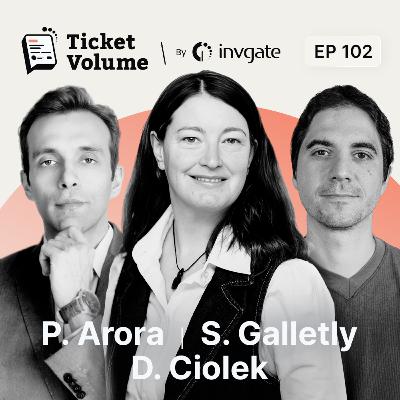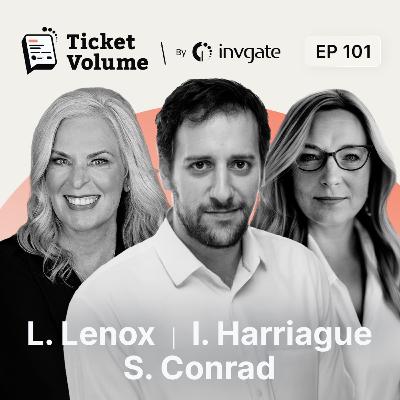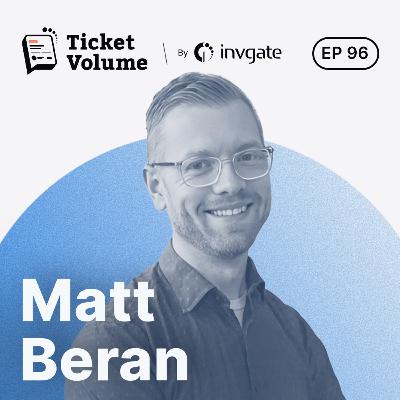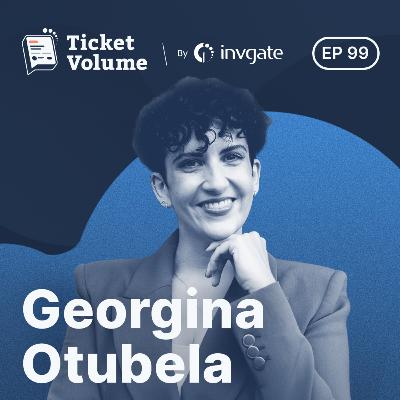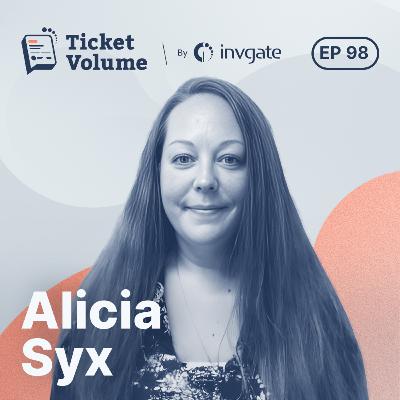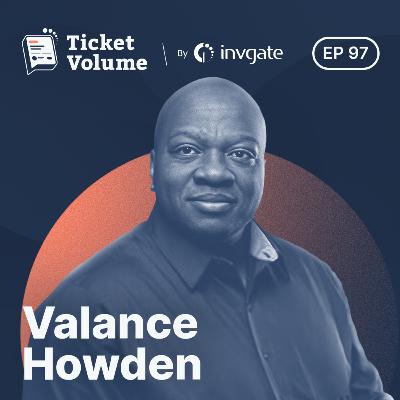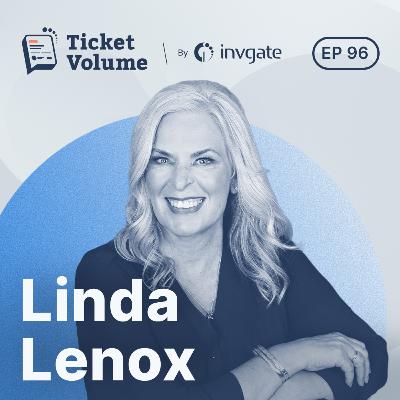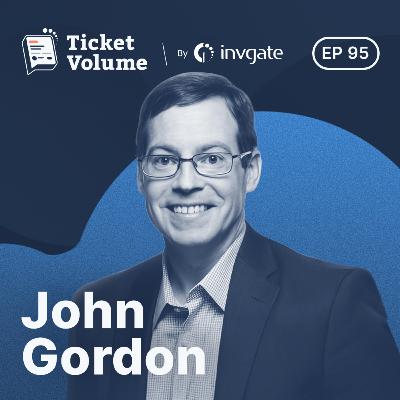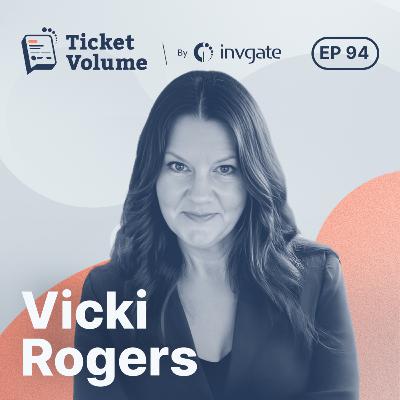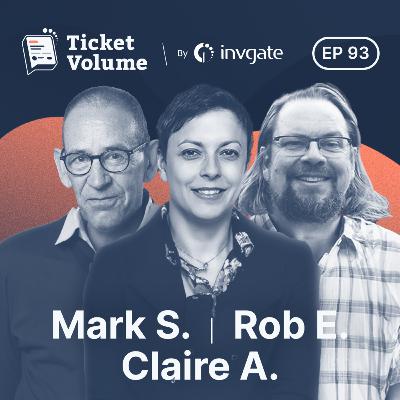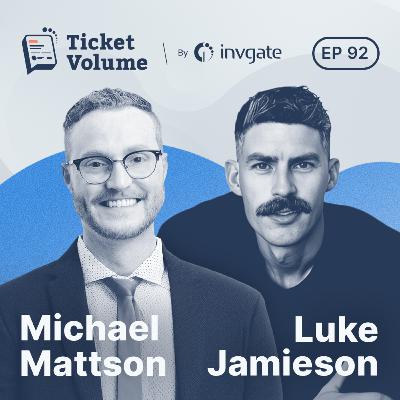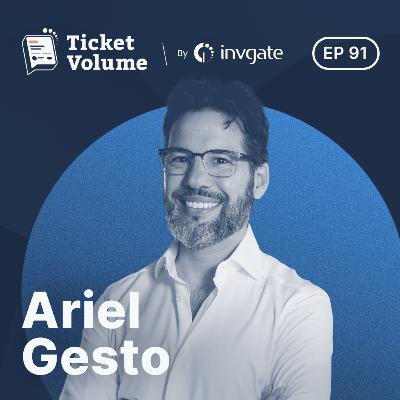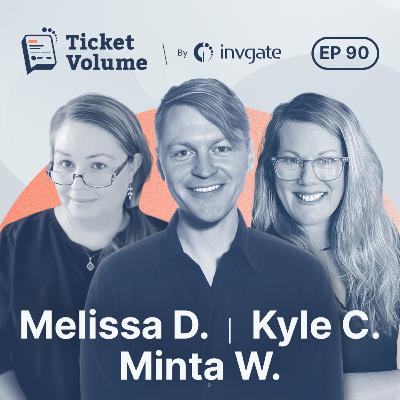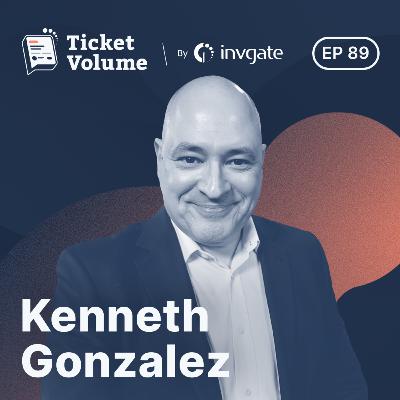Discover Ticket Volume - IT Podcast
Ticket Volume - IT Podcast

114 Episodes
Reverse
In this episode of Ticket Volume – IT Podcast, host Matt Beran sits down with Prashant Arora (PepsiCo), Daniel Ciolek (InvGate), and Suzanne Galletly (AXELOS) to unpack how Artificial Intelligence is reshaping IT Service Management. From VR-powered training and digital twins to self-healing IT operations and ethical dilemmas, this episode explores both the promise and the pitfalls of AI in ITSM.Here’s a sneak peek:- How PepsiCo uses digital twins and VR to cut training from 2 months to 2 weeks.- The role of AI in ticket triage, automation, and knowledge management.- Why “AI bias” can overload top performers while others do less.- The limits of AI models and why “AI is extremely silly… and powerful.”- Governance, ethics, and why loneliness is now considered a business risk.Whether you’re curious about real-world AI use cases, worried about risks, or trying to understand where Service Management is heading, this conversation delivers insights from every angle.Don’t forget to like, subscribe, and share your thoughts in the comments! How is your organization approaching AI in ITSM?#AIinITSM #ServiceManagement #ArtificialIntelligence #ITOperations #ITLeadership #TicketVolume #Podcast
When is it really time to replace IT tools? In this episode of Ticket Volume – IT Podcast, we dive into the warning signs, triggers, and challenges that push organizations to switch IT software.Host Matt Beran sits down with Ignacio Harriague (Director of Product Marketing at InvGate), Linda Lenox (Program Delivery Director at Hall's Culligan Water), and Sandi Conrad (Advisory Fellow at Info-Tech Research Group) to uncover the pain points that drive tool replacement, how to secure budget, and the mistakes to avoid when choosing a new solution.Here’s a sneak peek:The real pain points that push teams to switch IT tools.Why shadow IT emerges when tools no longer fit.How to articulate ROI and secure budget for new solutions.Common pitfalls in tool selection (and how to avoid them).What IT leaders should measure to prove value.Whether you’re already considering a replacement or just want to recognize the early warning signs, this episode is packed with practical insights for IT leaders navigating tool change.Don’t forget to like, subscribe, and share your thoughts in the comments! When did your team realize it was time to replace an IT tool?#replaceittools #switchittools #itleadership #itsm #servicemanagement #itsolutions #itpodcast #ticketvolume
In this special 100th episode of Ticket Volume – IT Podcast, we flip the script.Instead of interviewing a guest, host and InvGate Product Specialist Matt Beran takes a moment to reflect on the journey so far — what the podcast has meant to him, how it’s changed his perspective on IT, and the five biggest lessons he’s learned from over 100 conversations with industry leaders.He also revisits standout episodes that surprised him, challenged him, or simply stuck with him — from mental health to experience management to change enablement.Here’s a sneak peek:1. Why complexity is unavoidable — and that’s okay.The value of sitting with a problem instead of rushing to fix it.How unexpected ideas can lead to breakthrough change.Why your network might be your biggest asset.A reminder that people are the heart of all tech.Whether you’ve been with us since episode one or just tuned in recently, this one’s for you. Thanks for being part of the Ticket Volume community!Don’t forget to like, subscribe, and share your thoughts — we’d love to hear from you.
In this episode of Ticket Volume – IT Podcast, Matt Beran is joined by Georgina Otubela, Service Delivery Manager at Vita Bank, to dive deep into service design, incident management, and the role of trust in IT services. Gabriela shares her insights on how IT teams can build strong relationships with users, respond effectively to incidents, and balance automation with human interaction to create better service experiences.Here’s a sneak peek:1. Why trust is the foundation of great IT services.2. How to improve incident management by focusing on communication.3. The role of automation in freeing up IT teams—and when not to use it.4. Why transparency and accountability are key to service recovery.5. How to recognize when you’ve designed a truly great IT service.Tune in for an insightful conversation packed with real-world advice for IT professionals looking to enhance their service management approach. Don’t forget to like, subscribe, and share your thoughts in the comments!#ServiceManagement #ITSM #IncidentManagement #Automation #ITLeadership #ITServiceDesign #CustomerExperience #ITTrust #TicketVolume #Podcast
In this episode of Ticket Volume – IT Podcast, Matt Beran sits down with Alicia Syx, IT Asset Disposition (ITAD) expert at Sycamore International, to expose the hidden risks and overlooked opportunities in IT recycling. From data security failures to unexpected financial benefits, Alicia reveals what most companies get wrong about disposing of their old tech—and how to fix it.Here’s a sneak peek:1. The shocking reality of IT asset graveyards and untracked tech.2. Why ""wiping a hard drive"" isn’t enough to keep your data safe.3. The certifications that separate responsible IT recycling from risky disposal.4. How companies can turn old tech into cash instead of paying to get rid of it.5. The environmental impact of short-lived devices (and what to do about it).If your company still handles IT disposal like an afterthought, this episode will change your perspective. Listen now to learn how to protect your data, save money, and make IT recycling work for you!Don’t forget to like, subscribe, and share your thoughts in the comments! How does your organization handle IT recycling?#ITRecycling #ITAD #DataSecurity #TechDisposal #Ewaste #SustainableIT #ITAssetManagement #SecureIT #TicketVolume #Podcast
Governance—it’s a term we hear all the time in IT and business, but do we really understand it? In this episode of Ticket Volume – IT Podcast, Matt Beran sits down with Valence Howden, Advisory Fellow at InfoTech Research Group, to break down governance, its misconceptions, and how it can truly enable organizations instead of holding them back.Here’s a sneak peek:1. What governance really means (hint: it’s not just bureaucracy).2. How to spot healthy vs. unhealthy governance in your organization.3. Why governance should be an enabler, not a roadblock to change.4. The role of governance in IT teams, Change Management, and risk mitigation.5. How to fix broken governance and make it work for your business.If governance has ever felt like a frustrating set of rules instead of a strategic advantage, this conversation is for you. Tune in now to rethink how governance impacts IT, decision-making, and organizational success!Don’t forget to like, subscribe, and share your thoughts in the comments! Have you experienced great (or terrible) governance in your organization? Let’s discuss!#OrganizationalGovernance #ITGovernance #ITLeadership #GovernanceFramework #ChangeManagement #DigitalTransformation #TicketVolume #Podcast
In this episode of Ticket Volume, Matt Beran welcomes Linda Lenox, a Service Management expert with decades of experience transforming IT operations. Together, they dive into the art and science of crafting meaningful Service Level Agreements (SLAs) that align with business objectives, foster collaboration, and empower service desk teams. From overcoming the fear of SLAs to leveraging them as tools for continuous improvement, Linda shares actionable insights and real-world examples to inspire IT leaders.
Here’s a sneak peek:
1. Why SLAs shouldn’t be a “stick” for service desk agents.
2. The importance of starting SLA discussions with current metrics.
3. How SLAs can bridge the gap between IT and the business.
4. Tips for balancing metrics like first call resolution and call times.
5. Using SLAs as a tool for service improvement, not just measurement.
Tune in for an engaging conversation packed with practical advice for IT pros, service management leaders, and anyone striving to make SLAs a business enabler. Don’t forget to like, subscribe, and share your thoughts—we’d love to hear from you!
In this episode of Ticket Volume, Matt Beran sits down with John Gordon, Senior VP of HP Managed Solutions Division, to explore how preventative Incident Management is reshaping IT operations. With a vision for zero-incident environments, John shares strategies to move from reactive problem-solving to proactive prevention, helping IT teams reduce downtime and improve user satisfaction.
Here’s a sneak peek:
1. Why zero incidents should be every IT team’s goal.
2. The role of telemetry and automation in proactive IT operations.
3. How redefining SLAs can drive a preventative mindset.
4. The challenge of measuring hidden ROI—and why it’s worth it.
5. Lessons from HP’s success with preventative strategies.
Tune in to learn how preventative Incident Management can transform your IT approach and hear actionable advice from one of the industry’s leading voices. Don’t forget to like, subscribe, and share your thoughts in the comments!
Optimizing Service Management in higher education with Vicki Rogers
In this episode of Ticket Volume, Matt Beran sits down with Vicki Rogers, Director of Service Management at Georgia Tech, to explore the unique challenges and opportunities of service management in higher education. From fostering a community of practice across 26 institutions to leveraging data for driving change, Vicki shares her journey of collaboration, leadership, and people-first strategies.
Here’s a sneak peek:
1. How to build a grassroots network for IT collaboration.
2. The importance of data in advocating for IT improvements.
3. Balancing diverse stakeholder needs in higher education IT.
4. Strategies for smaller institutions with limited resources.
5. Why humility and relationships are key to driving organizational change.
Tune in for an inspiring conversation packed with actionable insights for IT leaders and service management pros. Don’t forget to like, subscribe, and share your thoughts—we’d love to hear from you!
In this episode of Ticket Volume, Matt Beran reunites with ITSM legends Rob England, Claire Agutter, and Mark Smalley to explore how 2024 shaped IT Service Management and what trends will define the years ahead. This dynamic conversation revisits last year’s predictions, reflects on the year’s pivotal events, and delves into the evolving landscape of Service Management.
Here’s a sneak peek:
1. Why the open-source model faced challenges in 2024—and what it means for IT teams.
2. How AI is transforming workflows and becoming an integral part of ITSM.
3. The rise of niche professional communities and the shifting role of platforms like LinkedIn.
4. Cybersecurity wake-up calls and strategies for securing IT supply chains.
5. Predictions for 2025, including human-centric ITSM, sustainability, and adaptive frameworks.
Join us for a thought-provoking discussion packed with insights, advice, and a few philosophical gems from three of ITSM’s brightest minds. Whether you’re an IT pro or just curious about the future of Service Management, this episode is a must-watch!
Don’t forget to like, subscribe, and share your take on the trends shaping ITSM in the comments below!
Emotional Intelligence, CX, and Building Community with Luke Jamieson and Michael Mattson
In this episode of Ticket Volume, Matt Beran sits down with CX leaders Luke Jamieson and Michael Mattson to unpack the evolving roles of emotional intelligence and community-building in Customer and Employee Experience. From practical advice for fostering employee engagement to the game-changing impact of tools like AI and observability, this episode delivers actionable insights for modern leaders.
Here’s a sneak peek:
1. Why emotional intelligence is the backbone of CX and EX.
2. The difference between employee engagement and experience (and why it matters).
3. How community-driven projects like Twenty20ish redefine networking.
4. Leveraging AI and Journey AI for better CX strategies.
5. Tips for newcomers starting out in CX and service roles.
Tune in to explore how emotional intelligence and technology can transform the way we work and connect. Don’t miss it!
AI, Leadership, and the Future of Service Management with Ariel Gesto. In this episode of Ticket Volume, Matt Beran sits down with Ariel Gesto, CEO and co-founder of InvGate, to explore the game-changing (and sometimes intimidating) role of AI in IT and business.
From cutting through the hype to discussing how AI can truly enhance Service Management, Ariel shares invaluable insights on staying grounded while leading innovation. You’ll also hear his inspiring story of building InvGate from Buenos Aires into a global leader—and how passion and purpose drive his every decision.Here’s what’s inside:
1. Why fear of AI is holding businesses back.
2. How InvGate’s AI service layer delivers real value (without replacing people!).
3. The right way to adopt AI while maintaining governance and data integrity.
4. Ariel’s journey as a founder—and his advice for future entrepreneurs.
5. Why simplifying workflows can change lives for IT teams. If you’re curious about where AI fits in IT Service Management or want to hear what it takes to lead a global company, this episode is a must-watch!
Don’t forget to like, subscribe, and share your thoughts in the comments. We’d love to hear your take on AI and the future of IT!
---
Share your feedback!
Help us improve Ticket Volume by taking our quick year-end survey at this link. Your input will shape our 2025 content! 🎙️✨
In this episode of Ticket Volume, Matt Beran reconnects with the team behind JAMF’s Service Management Office (SMO) to explore their journey and success stories! Featuring insights from Melissa Dunham, Senior Director of IT Support and Services, along with Kyle Carlson and Minta Wahlers, this conversation sheds light on the practical steps and challenges involved in building a thriving SMO.
Here’s a quick sneak peek:
1. How Knowledge Management boosts collaboration and efficiency.
2. Building trust and buy-in through thoughtful Change Management.
3. The essential distinctions between Release and Change Management.
4. Transforming IT Asset Management into a foundational practice.
5. The power of Organizational Change Management for smooth transitions.
Tune in for an inspiring look into JAMF’s SMO and learn valuable strategies to support your own ITSM initiatives.
---
Share your feedback!
Help us improve Ticket Volume by taking our quick year-end survey at this link. Your input will shape our 2025 content! 🎙️✨
Join us as we dive into the latest Ticket Volume - IT podcast episode with the insightful Kenneth "Kengon" Gonzalez! This time, Kenneth, a former Gartner analyst and industry advisor, shares why focusing on organizational capabilities (not just tools!) is the future of IT Service Management and business growth.
If you’ve ever wondered if ITSM is dead, or why Gartner retired its famous Magic Quadrant, this is for you! Get ready for some bold perspectives and a reimagined approach to customer success and organizational improvement.
Here’s a quick sneak peek:
1. Why ITSM tools are losing their edge.
2. The power of organizational capabilities for real impact.
3. Moving from SLAs to XLAs for customer experience that matters.
4. Why maturity models might be holding you back.
5. The surprising reason Gartner retired the Magic Quadrant.
Don't miss out on this refreshing look at ITSM and organizational evolution with Kenneth Gonzalez
---
Share your feedback!
Help us improve Ticket Volume by taking our quick year-end survey at this link. Your input will shape our 2025 content! 🎙️✨
In this episode of Ticket Volume, Matt Beran chats with Shane Carlson, Director of Global Presales Strategic Services at Airtable, about the evolution of Service Management processes. They explore how rigid processes can hold teams back, the shift to more flexible patterns, and the impact of technology on modern workflows.
Discover how agility and outcome-focused strategies are transforming Service Management.
---
Share your feedback!
Help us improve Ticket Volume by taking our quick year-end survey at this link. Your input will shape our 2025 content! 🎙️✨
In this episode of Ticket Volume, host Matt Beran dives into the crucial topic of technology and mental health.
Joined by experts Dr. Erika Torres, Aileen Day, and Emily Hubbard, they explore the challenges tech professionals face, from empathy fatigue to communication breakdowns.
Discover actionable insights on how to build healthier, more empathetic workplaces, the importance of soft skills, and the systemic changes needed to support mental well-being in tech.
Don’t miss this enlightening conversation about the intersection of technology and mental health!
Is the IT job market strong or in crisis? Where should you search for jobs? How do you land interviews and stand out? These are the main questions we tackle in this episode of Ticket Volume.
Join host Matt Beran as he dives into the IT job market with experts David Lowe and Stephanie Lundberg. They explore current trends, challenges, and strategies for navigating the job landscape. Don't miss out on their valuable insights! Comment and subscribe to stay connected with us at InvGate. Let’s keep the conversation going!
Join us in Episode 85 of Ticket Volume as we delve into the world of Service Management Maturity and Service Desk Certifications with industry experts Joshua Nelson, Alex Harding, and Sarah Jayne Bulley.
Discover the five levels of Service Desk Certifications, their importance in IT Service Management, and how achieving these certifications can elevate your organization's service desk operations.
This episode offers valuable insights and practical advice for IT professionals looking to enhance their service delivery and align with industry best practices.
Join us for an enlightening episode of the Ticket Volume podcast as host Matt Beran sits down with Dr. Tuuli Bell, a leading expert in sustainability and Environmental, Social, and Governance (ESG) criteria. In this discussion, they explore the critical role of sustainability across various sectors, including construction, textiles, and IT.
Dr. Bell shares her extensive knowledge on how businesses can adopt sustainable practices, highlighting the importance of ESG in evaluating their societal impact. Discover how the IT industry is stepping up to the challenge, from energy-efficient data centers to the emerging field of green software development.
Learn about the circular economy and how individuals can take actionable steps towards sustainability in their daily lives. Dr. Bell emphasizes that every effort counts, and together we can create a positive impact on our planet.
Don’t miss this opportunity to gain valuable insights into sustainable practices and the future of ESG. Be sure to like, comment, and subscribe for more engaging discussions on sustainability and technology!
Join us for a thrilling dive into the world of AI in IT Service Management with expert Daniel Ciolek from InvGate. In this episode, Daniel spills the secrets on how AI is transforming ITSM—from supercharging response times to enhancing document privacy. Get ready for a fun and insightful journey into the future of ITSM.
Don’t miss out!
What do you think of this episode? How are you using AI in ITSM? Let us know.
See you in the next episode!



